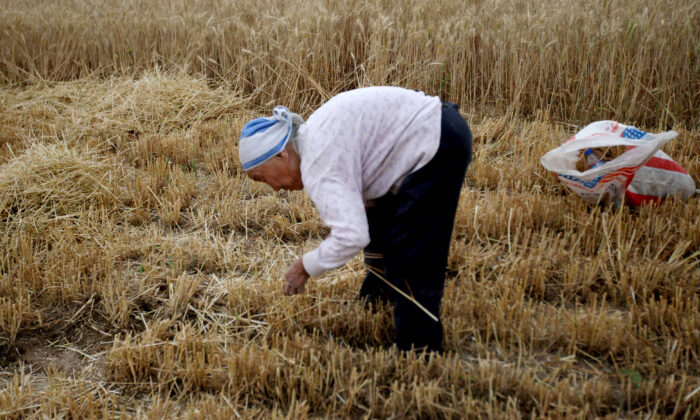Popcorn and Inspiration: ‘Moonrise Kingdom’: Sweet Nostalgia for American Innocence
Chinese official data confirmed that wheat production declined this year, while the Communist Party’s rubber-stamp legislature said it would issue new laws to prohibit food waste, further indicating that the country was facing a food shortage.
Chinese leader Xi Jinping issued a directive on food waste via state-run media Xinhua on Aug. 11, in which he said, “the food waste phenomenon is shocking and distressing [in China].” This is the second time in recent weeks that Xi commented on the country’s food issues.
On July 26, Xinhua published another message from Xi, in which he told officials to treat “food supplies as the first priority of local governance.”
After Xi issued his new instructions, popular online personalities known for their “mukbang,” or video broadcasts of themselves eating large amounts of food, were criticized by Chinese social media platforms.
In a Wednesday report, state-run newspaper Hongxing News quoted an executive from Douyin—the Chinese version of popular video-sharing app TikTok—that the platform would delete such videos and remove users’ accounts if they promote eating a lot.
Several famous Chinese “mukbang” personalities’ social media accounts and videos were removed on Thursday.
Meanwhile, local governments also issued new rules to restrict the amount of food people can order at restaurants.
For example, in Wuhan—ground zero of the CCP virus pandemic—ruled on Aug. 11 that people should order “N-1” meals at restaurants, meaning if ten people are seated, they should only order nine meals. If the party is two to three people, restaurants should encourage customers to order half-sized meals, according to the rule.
 Wheat grains. (Sean Gallup/Getty Images)
Wheat grains. (Sean Gallup/Getty Images)Food Shortage
In China, farmers only sell grains to the government. Food companies then buy up crops from the government to make into food products.
Official data can thus be a gauge for how much crops farmers have harvested.
China’s National Food and Strategic Reserves Administration announced on Wednesday that it had purchased 42.857 million metric tons of wheat from farmers this summer, which is 9.383 million metric tons, or about 18 percent, less than the same period last year.
The data included a partial breakdown for several provinces. Among them, the central government purchased 36.061 million metric tons from five provinces that are the country’s major wheat production areas—about 10 million metric tons less than last year.
The data did not include other provinces that produce wheat, such as Shaanxi, Shanxi, Inner Mongolia, Gansu, Xinjiang, Qinghai, and the three provinces of northeastern China. But these regions recently suffered droughts.
 An SRI hybrid rice field in Yunnan province, China, in 2004 (Courtesy Zhu Defeng)
An SRI hybrid rice field in Yunnan province, China, in 2004 (Courtesy Zhu Defeng)U.S.-based China affairs commentator Tang Jingyuan also noted that authorities’ data are not trustworthy, meaning the real decline in wheat production could be even greater.
This year, with historical floods impacting 27 Chinese provinces, in addition to pest invasions and pandemic-related delays, the country is producing less grains.
But it could be difficult to import them from other countries.
In April, India, Thailand, Vietnam, and Bangladesh announced bans on exporting rice, owing to logistical disruptions due to COVID-19-related lockdowns or local supply shortages. India and Thailand are the two biggest rice exporters in the world.
And on Thursday, the Commission of Legislative Affairs within China’s rubber-stamp legislature said it was preparing new laws to prevent food waste, including by regulating the whole process of food production—planting of crops, storage, transport, and so on.
 A farmer bundles dried stalks of wheat in a field in Cangzhou, in China’s Hebei Province, in February 2009. (Frederic J. Brown/Getty Images)
A farmer bundles dried stalks of wheat in a field in Cangzhou, in China’s Hebei Province, in February 2009. (Frederic J. Brown/Getty Images)Isolationism?
Commentator Tang analyzed that the new laws suggested a food supply problem—and that the Party wants to establish a domestic-only food production chain so as not to rely on foreign imports.
He said that Beijing’s decision to enact laws—as opposed to short-term directives—indicated that the Chinese regime wanted to create a self-reliant food system and isolate itself from the world.
The reality is “China can’t feed itself now. It needs the imported grains,” Tang said.
Asked why central authorities issued the recent food policies, Yang Bin, economist and vice president of China’s elite Tsinghua University, told Epoch Times-affiliated media NTD that “[Chinese leader Xi Jinping] intention is to separate China from the world. He plans to cut off the connections to the world to avoid all the possible potential sanctions [on China],” Yang said in a phone interview.
The United States has recently sanctioned Chinese officials for their role in eroding freedoms in Hong Kong and human rights abuses against Uyghur Muslims residing in the Xinjiang region.
Focus News: Beijing Cracks Down on Extreme-Eating Videos as Country Faces Food Shortage
